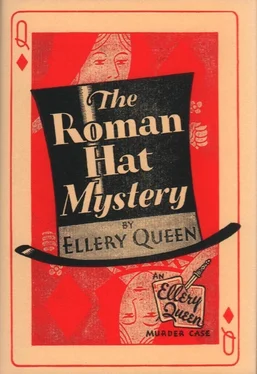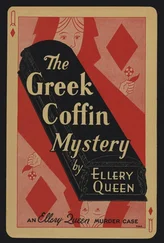Cronin dashed into the kitchenette at Ellery’s nod in that direction. He was back in a moment with a six-foot stepladder. The Inspector, mounting to the highest rung, found that his fingers were still short of touching the rod. Ellery solved the difficulty by ordering his father down and climbing to the top himself. Standing on the ladder he was in a position to explore the top of the canopy.
He grasped the damask firmly and pulled. The entire fabric gave way and fell to the sides, revealing a wooden panel about twelve inches deep — a framework which the hangings had concealed. Ellery’s fingers swept swiftly over the wooden relief-work of this panel. Cronin and the Inspector were staring with varying expressions up at him. Finding nothing that at the moment presented a possibility of entrance, Ellery leaned forward and explored the damask directly beneath the floor of the panel.
“Rip it down!” growled the Inspector.
Ellery jerked violently at the material and the entire canopy of damask fell to the bed. The bare unornamented floor of the panel was revealed.
“It’s hollow,” announced Ellery, rapping his knuckles on the underside paneling.
“That doesn’t help much,” said Cronin. “It wouldn’t be a solid chunk, anyway. Why don’t you try the other side of the bed, Mr. Queen?”
But Ellery, who had drawn back and was again examining the side of the panel, exclaimed triumphantly. He had been seeking a complicated, Machiavellian “secret door” — he found now that the secret door was nothing more, subtle than a sliding panel. It was cleverly concealed — the juncture of sliding and stationary panels was covered by a row of wooden rosettes and clumsy decorations — but it was nothing that a student of mystery lore would have hailed as a triumph of concealment.
“It begins to appear as if I were being vindicated,” Ellery chuckled as he peered into the black recesses of the hole he had uncovered. He thrust a long arm into the aperture. The Inspector and Cronin were staring at him with bated breath.
“By all the pagan gods,” shouted Ellery suddenly, his lean body quivering with excitement. “Do you remember what I told you, Dad? Where would those papers be except in — hats!”
His sleeve coated with dust, he withdrew his arm and the two men below saw in his hand a musty silk tophat!
Cronin executed an intricate jig as Ellery dropped the hat on the bed and dipped his arm once more into the yawning hole. In a moment he had brought out another hat — and another — and still another! There they lay on the bed — two silk hats and two derbies.
“Take this flashlight, son,” commanded the Inspector. “See if there’s anything else up there.”
Ellery took the proffered electric torch and flashed its beam into the aperture. After a moment he clambered down, shaking his head.
“That’s all,” he announced, dusting his sleeve, “but I should think it would be enough.”
The Inspector picked up the four hats and carried them into the living room, where he deposited them on a sofa. The three men sat down gravely and regarded each other.
“I’m sort of itching to see what’s what,” said Cronin finally, in a hushed voice.
“I’m rather afraid to look,” retorted the Inspector.
“Mene mene tekel upharsin,” laughed Ellery. “In this case it might be interpreted as ‘the handwriting on the panel.’ Examine on, Macduff!”
The Inspector picked up one of the silk hats. It bore on the rich satiny lining the chaste trademark of Browne Bros. Ripping out the lining and finding nothing beneath, he tried to tear out the leather sweatband. It resisted his mightiest efforts. He borrowed Cronin’s pocket knife and with difficulty slashed away the band. Then he looked up.
“This hat, Romans and countrymen,” he said pleasantly, “contains nothing but the familiar ingredients of hat-wear. Would you care to examine it?”
Cronin uttered a savage cry and snatched it from the Inspector’s hand. He literally tore the hat to pieces in his rage.
“Heck!” he said disgustedly, throwing the remnants on the floor. “Explain that to my undeveloped brain, will you, Inspector?”
Queen smiled, taking up the second silk hat and regarding it curiously.
“You’re at a disadvantage, Tim,” he said. “We know why one of these hats is a blank. Don’t we, Ellery?”
“Michaels,” murmured Ellery.
“Exactly — Michaels,” returned the Inspector.
“Charley Michaels!” exclaimed Cronin. “Field’s strong-arm guy, by all that’s holy! Where does he come into this?”
“Can’t tell yet. Know anything about him?”
“Nothing except that he hung onto Field’s coattails pretty closely. He’s an ex-jailbird, did you know that?”
“Yes,” replied the Inspector dreamily. “We’ll have a talk about that phase of Mr. Michaels some other time... But let me explain that hat: Michaels on the evening of the murder laid out, according to his statement, Field’s evening clothes, including a silk hat. Michaels swore that as far as he knew Field possessed only one topper. Now if we suppose that Field used hats for concealing papers, and was going to the Roman Theatre that night wearing a ‘loaded’ one he must necessarily have substituted the loaded hat for the empty one which Michaels prepared. Since he was so careful to keep only one silk hat in the closet, he realized that Michaels, should he find a topper, would be suspicious. So, in switching hats, he had to conceal the empty one. What more natural than that he should put it in the place from which he had taken the loaded hat — the panel above the bed?”
“Well, I’ll be switched!” exclaimed Cronin.
“Finally,” resumed the Inspector, “We can take it as gospel that Field, who was devilishly careful in the matter of his headgear, intended to restore the theatre hat to its hideaway when he got home from the Roman. Then he would have taken out this one which you’ve just torn up and put it back in the clothes closet... But let’s get on.”
He pulled down the leather innerband of the second silk hat, which also bore the imprint of Browne Bros. “Look at this, will you!” he exclaimed. The two men bent over and saw on the inner surface of the band, lettered with painful clarity in a purplish ink, the words BENJAMIN MORGAN.
“I’ve got to pledge you to secrecy, Tim,” said the Inspector immediately, turning to the red-haired man. “Never let on that you were a witness to the finding of papers in any way implicating Benjamin Morgan in this affair.”
“What do you think I am, Inspector?” growled Cronin. “I’m as dumb as an oyster, believe me!”
“All right, then.” Queen felt the lining of the hat. There was a distinct crackle.
“Now,” remarked Ellery calmly, “we know for the first time definitely why the murderer had to take away the hat Field wore Monday night. In all likelihood the murderer’s name was lettered in the same way — that’s indelible ink, you know — and the murderer couldn’t leave a hat with his own name in it at the scene of the crime.”
“By gosh, if you only had that hat, now,” cried Cronin, “you’d know who the murderer is!”
“I’m afraid, Tim,” replied the Inspector dryly, “that hat is gone forever.”
He indicated a row of careful stitches at the base of the inner band, where the lining was attached to the fabric. He ripped these stitches swiftly and inserted his fingers between the lining and the crown. Silently he drew out a sheaf of papers held together by a thin rubber Band.
“If I were as nasty as some people think I am,” mused Ellery, leaning back, “I might with perfect justice say, ‘I told you so.’”
“We know when we’re licked, my son — don’t rub it in,” chortled the Inspector. He snapped off the rubber band, glanced hastily through the papers and with a satisfied grin deposited them in his breast pocket.
Читать дальше












